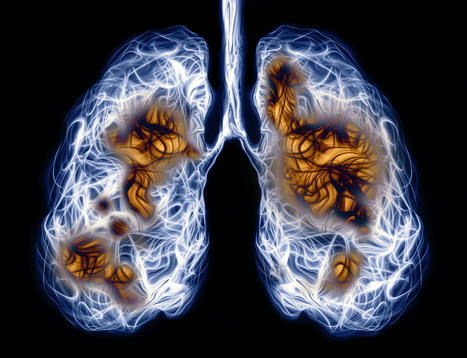Via Juan Lama

|
Rescooped by Dr. Stefan Gruenwald from Virus World |
Viral infection can lead to acute respiratory distress syndrome that damages the lungs and is often lethal. Zhao et al. show that the TGF-β receptor 2 (TGF-βR2) is important for lung endothelial cells to recover after injury due to influenza virus or SARS-CoV-2 infection. The researchers used mice, human organoids, and human endothelial cells to demonstrate how TGF-βR2 interacts with VEGFA specifically in endothelial lung cells to promote tissue regeneration after viral injury. They also developed lung-targeted nanoparticles to deliver Vegfa mRNA to promote lung healing in mice lacking TGF-βR2. This study highlights the potential for targeting TGF-βR2 signaling in lung endothelial cells as a treatment for acute respiratory distress syndrome.
Disruption of pulmonary vascular homeostasis is a central feature of viral pneumonia, wherein endothelial cell (EC) death and subsequent angiogenic responses are critical determinants of the outcome of severe lung injury. A more granular understanding of the fundamental mechanisms driving reconstitution of lung endothelium is necessary to facilitate therapeutic vascular repair.
Now a team of scientists demonstrated that TGF-β signaling through TGF-βR2 (transforming growth factor–β receptor 2) is activated in pulmonary ECs upon influenza infection, and mice deficient in endothelial Tgfbr2 exhibited prolonged injury and diminished vascular repair. Loss of endothelial Tgfbr2 prevented autocrine Vegfa (vascular endothelial growth factor α) expression, reduced endothelial proliferation, and impaired renewal of aerocytes thought to be critical for alveolar gas exchange.
Angiogenic responses through TGF-βR2 were attributable to leucine-rich α-2-glycoprotein 1, a proangiogenic factor that counterbalances canonical angiostatic TGF-β signaling. Further, the scientists developed a lipid nanoparticle that targets the pulmonary endothelium, Lung-LNP (LuLNP). Delivery of Vegfa mRNA, a critical TGF-βR2 downstream effector, by LuLNPs improved the impaired regeneration phenotype of EC Tgfbr2 deficiency during influenza injury.
These studies defined a role for TGF-βR2 in lung endothelial repair and demonstrated efficacy of an efficient and safe endothelial-targeted LNP capable of delivering therapeutic mRNA cargo for vascular repair in influenza infection.
Via Juan Lama



 Your new post is loading...
Your new post is loading...








Amazing
https://buypsychedelicdrugs.com/product-category/dmt/
https://buypsychedelicdrugs.com/product/5-meo-dmt/
https://buypsychedelicdrugs.com/product/4-aco-dmt/
https://buypsychedelicdrugs.com/product/ayahuasca/
https://buypsychedelicdrugs.com/product/changa-dmt/
https://buypsychedelicdrugs.com/product/buy-dmt-vape-pen/
https://buypsychedelicdrugs.com/product/lsd-tabs/
https://buypsychedelicdrugs.com/product/buy-mimosa-hostilis-root-bark-powdered-mhrb/
https://buypsychedelicdrugs.com/product/nn-dmt/
https://buypsychedelicdrugs.com/product/amanita-muscaria/
https://buypsychedelicdrugs.com/product/buy-dragons-dynamite-truffles/
https://buypsychedelicdrugs.com/product/golden-teachers/
https://buypsychedelicdrugs.com/product/buy-high-hawaiians-truffles/
https://buypsychedelicdrugs.com/product/liberty-caps/
https://buypsychedelicdrugs.com/product/buy-microdosing-psilocybin-truffles-10-pack/
https://buypsychedelicdrugs.com/product/buy-microdosing-psilocybin-truffles-2-pack-in-stock/
https://buypsychedelicdrugs.com/product/buy-microdosing-psilocybin-truffles-20-pack/
https://buypsychedelicdrugs.com/product/golden-teachers/
https://buypsychedelicdrugs.com/product/buy-penis-envy-mushroom/
https://buypsychedelicdrugs.com/product/codeine-promethazine/
https://buypsychedelicdrugs.com/product/ecstasy-mdma/
https://buypsychedelicdrugs.com/product/microdosing-psilocybin-truffles-1-pack-for-sale/
https://buypsychedelicdrugs.com/product/mush-rocks-truffles-for-sale/
https://buypsychedelicdrugs.com/product/pcp-powder/
https://buypsychedelicdrugs.com/product/cocaine/
https://buypsychedelicdrugs.com/product/methamphetamine/
https://buypsychedelicdrugs.com/product/xanax/
https://buypsychedelicdrugs.com/product/lsd-gel-tabs/
https://buypsychedelicdrugs.com/product/lsd-liquid/
https://caluaniemuelearoxidizeusa.com/product/buy-10l-caluanie-muelear-pasteurize/
https://caluaniemuelearoxidizeusa.com/product/buy-20l-caluanie-muelear-oxidize/
https://caluaniemuelearoxidizeusa.com/product/buy-5l-caluanie-muelear-pasteurize/
https://caluaniemuelearoxidizeusa.com/product/buy-caluanie-muelear-pasteurize/